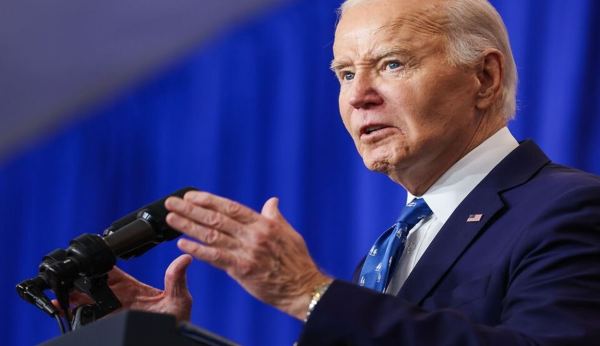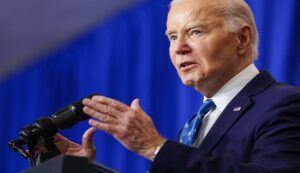
New York: In a major use of executive power at the conclusion of his term, US President Joe Biden declared on Friday that he would prevent Japan’s Nippon Steel from purchasing US Steel for USD 14.3 billion, according to CNN.

“As I have stated numerous times, steel production—and the steelworkers who produce it—are the backbone of our nation,” Biden said in a statement, highlighting the significance of steel manufacturing in the US. Resilient supply chains depend on a robust, domestically owned and run steel sector, which is a top national security objective.
The predicted ruling may have wider ramifications for foreign investment in US businesses. Even though Biden has opposed the agreement for a long time, it is still politically sensitive. Both Biden and President-elect Donald Trump have expressed significant opposition to the arrangement, which was initially revealed in December 2023. The agreement highlights the continued worries about foreign control of a once-dominant segment of American business, which has previously provoked bipartisan political opposition.
Biden stepped in after the president was left to make the final decision after the Committee on Foreign Investment in the United States (CFIUS) was unable to agree on the transaction’s potential national security dangers. Some fear that prohibiting such foreign investments might deter future foreign capital inflows into US corporations, even if the measure is politically popular domestically. US Steel, which had said that a large investment was required, would potentially face difficulties if the agreement is rejected.
Since the transaction was announced, the United Steelworkers (USW) union has been adamantly against it, expressing worries about the future of union employment at US Steel’s older facilities. Concerns have been expressed by the union over Nippon Steel’s potential to uphold these views, especially in Indiana and Pennsylvania. Following the decision, the USW issued a statement saying, “We have no doubt that it’s the right move for our members and our national security.”
However, US Steel and Nippon Steel swiftly contested the ruling, promising to file a lawsuit. “The president’s statement and order do not present any credible evidence of a national security issue, making it clear that this was a political decision,” the corporations said in a joint statement, expressing their dismay. Our only option is to take all necessary steps to safeguard our legal rights.
US Steel insists that the agreement is essential to revitalizing its aging facilities, saying it could have to close some of its mills if Nippon Steel didn’t spend USD 2.7 billion. The USW thinks the business might still turn a profit without the purchase, however. “We’re confident that with responsible management, US Steel will continue to support good jobs, healthy communities, and robust national and economic security well into the future,” the labor group said.
The history of US Steel, a former titan of the American industrial sector, is the basis for the resistance to the takeover. After being founded in 1901, it was the most valuable firm in the world and played a crucial role in the expansion of the national economy. But the company’s size and significance have drastically decreased over time. It used to be a representation of industrial might, but now it only has 14,000 employees, 11,000 of them are union members. According to CNN, US Steel continues to play an important role in American history, with around 18,000 retirees and their beneficiaries receiving pension payments.
Foreign control of such well-known American corporations has long alarmed politicians, especially in swing areas like Pennsylvania where US Steel is still present. One factor contributing to the potential acquisition’s intense political controversy is its strong ties to American history and pride. Given its historical significance as a pillar of American industrial might, many politicians find it uncomfortable to see US Steel in foreign hands. With firms like Nippon Steel and more recent “mini-mills” emerging as more effective rivals, US Steel’s fall is indicative of a larger trend in the US manufacturing industry.
Fears that Nippon Steel’s participation would result in job losses have heightened the union’s worries, especially because the business plans to move operations to more contemporary, non-unionized facilities in Texas. The USW is nevertheless skeptical despite Nippon’s insistence that it aims to continue operating the unionized mills, pointing to Nippon’s possible intentions to shift manufacturing to its mini-mill operations.
Opposition to the Nippon Steel acquisition is politically complex when seen within the larger political context. Even though he opposed the purchase, former President Trump has since embraced foreign investments from other Japanese businesses, including Softbank’s USD 100 billion plan to finance US artificial intelligence initiatives.
Biden’s move to restrict foreign investment from Japan’s Nippon Steel in the steel sector, according to critics, seems to have deeper political motivations since it begs the issue of why comparable investments from other nations are tolerated unquestioned. “President Biden’s claim that Japan’s investment in an American steel company poses a threat to national security is a pathetic and craven caving in to special interests that will make America less prosperous and safe,” said Jason Furman, a former Obama administration economist who criticized the decision.
The judgment may have long-term effects for foreign investment, according to industry experts. According to CNN, US Steel and other businesses in the US steel sector continue to have an economic influence despite their difficulties.
Important industries like construction, infrastructure, and automobile production still depend on steel, and their survival might be jeopardized by a decline in foreign investment.